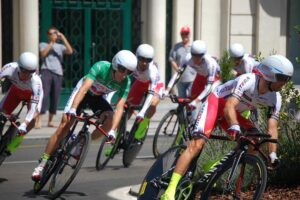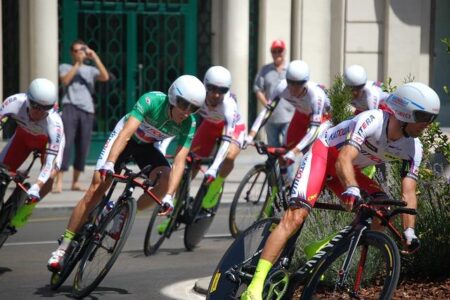In the world of professional cycling, debates over the greatest of all time (GOAT) have long captivated fans and experts alike. Recently, these discussions were reignited by Belgian cycling icon Eddy Merckx, who pushed back against the notion that Slovenian prodigy Tadej PogaÄŤar could be ranked alongside him. In a candid interview, Merckx described such comparisons as “crazy,” underscoring the extraordinary legacy he forged during his illustrious career. As PogaÄŤar continues to shatter records and dominate the sport, the questions surrounding his place in cycling history intensify. This article delves into Merckx’s comments, the criteria for measuring greatness in cycling, and what it truly means to achieve legendary status in a sport that has seen immense evolution over the decades.
Belgian Cycling Icon Questions Tadej PogaÄŤar’s Place in History Against Eddie Merckx
In the world of professional cycling, the legacy of Eddie Merckx looms large, and as one of Belgium’s most celebrated cycling figures, he has not shied away from weighing in on the contemporary debate surrounding Tadej PogaÄŤar’s burgeoning status in the sport. Merckx, often dubbed “The Cannibal” for his insatiable drive to win, referred to the notion of PogaÄŤar being on par with his own legendary career as “crazy.” Merckx emphasized the accolades he accumulated over his career, which include winning the Tour de France five times and setting records that many still consider unbreakable. He highlighted the following achievements that define his unmatched legacy in cycling:
- Multiple Grand Tour Victories: 11 in total, including five Tours de France.
- Monument Wins: A record 19, showcasing dominance across one-day classics.
- Unmatched Versatility: Victories across various terrains and race types.
While PogaÄŤar has made headlines with his compelling performances and astonishing skill at a young age, Merckx challenges enthusiasts to recognize the broader context of cycling history. He argues that comparisons should also include long-standing rivalries, the evolution of racing dynamics, and even advances in technology. The cycling world often engages in debates about greatness, yet a metric-based assessment could provide clarity. Below is a comparison table outlining key metrics of both cyclists, reinforcing the argument:
| Metric | Eddie Merckx | Tadej PogaÄŤar |
|---|---|---|
| Tour de France Wins | 5 | 2 (as of 2023) |
| Monuments Won | 19 | 2 (as of 2023) |
| Years Active | 1965-1978 | 2019-Present |
The Debate Over Cycling Greatness: Merckx’s Legacy vs. PogaÄŤar’s Promising Career
The ongoing debate about who holds the title of cycling’s greatest of all time intensifies with the recent comments from Belgian cycling legend Eddy Merckx. Known for his own unparalleled career that spanned the 1960s and 1970s, Merckx questioned the comparisons being drawn between his legendary performances and the impressive, yet still developing, career of Tadej PogaÄŤar. “As good as Merckx… Come on,” he stated, dismissing the notion that the young Slovenian could already be considered in the same breath as the cycling titan. Merckx emphasized that while PogaÄŤar is undoubtedly a phenomenal talent, the full body of work over a career is what defines greatness, not just a handful of standout victories.
Supporters of PogaÄŤar rally behind their champion, touting his rapid rise and significant accomplishments in major tours. The comparisons can be intriguing considering the stats, yet many experts argue that the sport continues to evolve and the demands placed on riders today are starkly different than those faced by Merckx. Factors influencing this evolution include:
- Technology: Advancements in bike design and performance.
- Training methods: Improved science in athlete conditioning.
- Competition level: A larger pool of highly trained riders entering the sport.
As PogaÄŤar gears up for future competitions, the cycling world watches closely. The table below highlights some key achievements of both Merckx and PogaÄŤar, illustrating the contrasting stages of their careers:
| Cyclist | Tour de France Wins | Giro d’Italia Wins | Career Victories |
|---|---|---|---|
| Eddy Merckx | 5 | 5 | 525+ |
| Tadej PogaÄŤar | 2 | 0 | 40+ |
While both cyclists have demonstrated extraordinary talent and determination, Merckx’s extensive accolades and longevity in the sport set a challenging standard for PogaÄŤar and upcoming riders. The debate on who deserves the title of the greatest cyclist of all time may continue, but one thing is certain: the world of cycling is ever-evolving, and every new generation brings forth talents that could challenge historical benchmarks. As each season unfolds, the spirit of competition ensures that cycling fans have much to look forward to, with new stories being written and legends in the making.
Analyzing the Criteria for the Greatest of All Time in Professional Cycling
The debate surrounding the greatest of all time (GOAT) in professional cycling frequently ignites passionate discussions among fans and experts alike. When analyzing what truly qualifies a cyclist for this prestigious title, several criteria must be taken into consideration:
- Major Championships: Total wins in events like the Tour de France, Giro d’Italia, and Vuelta a España.
- Consistency: Performance over multiple seasons, including podium finishes and participation in Grand Tours.
- Iconic Victories: Signature wins that leave a lasting impact on the sport, showcasing exceptional skill and determination.
- Influence on the Sport: Contribution to cycling’s popularity and evolution through innovation and charisma.
While cycling ace Tadej PogaÄŤar has made headlines with his remarkable accomplishments at a young age, many veteran cyclists argue that comparing him to the likes of Eddy Merckx is premature. Merckx’s record, comprising a staggering 525 professional victories and five Tour de France titles, is often deemed insurmountable. The following table highlights key statistics comparing both cyclists’ achievements:
| Criterion | Eddy Merckx | Tadej PogaÄŤar |
|---|---|---|
| Career Wins | 525 | ~40 |
| Tour de France Titles | 5 | 2 |
| World Championships | 3 | 1 |
As cycling legend Vlaanderen recently articulated, labeling PogaÄŤar as the GOAT is “crazy,” suggesting that while PogaÄŤar’s talent is undeniable, it may still fall short of the towering legacy established by Merckx. The legacy of a cyclist isn’t merely defined by statistics; it encompasses the broader context of their impact on the cycling world, making the GOAT conversation one that evolves with each generation.
The Way Forward
In conclusion, the debate surrounding Tadej PogaÄŤar’s potential to be deemed the greatest cyclist of all time remains as contentious as ever. While his exceptional talent and impressive track record have earned him admiration from fans and experts alike, Belgian cycling legend Eddy Merckx’s assertion that labeling PogaÄŤar in the same breath as him is “crazy” underscores the weight of history in the sport. As cycling enthusiasts continue to analyze the achievements of past and present champions, the conversation will undoubtedly evolve, keeping the legacy of competitors like Merckx and the promising career of PogaÄŤar at the forefront. Ultimately, time will tell how PogaÄŤar’s career unfolds, and whether he can truly challenge the stature of cycling’s all-time greats. For now, the cycling world watches closely, eager to see what the future holds for this remarkable athlete.











